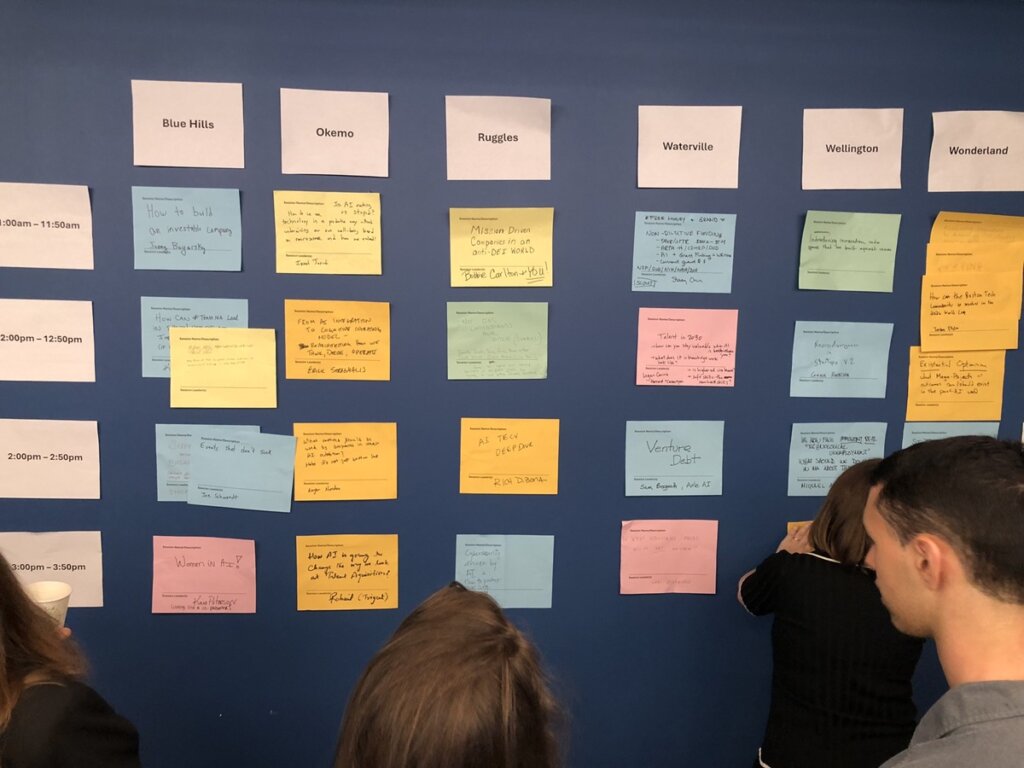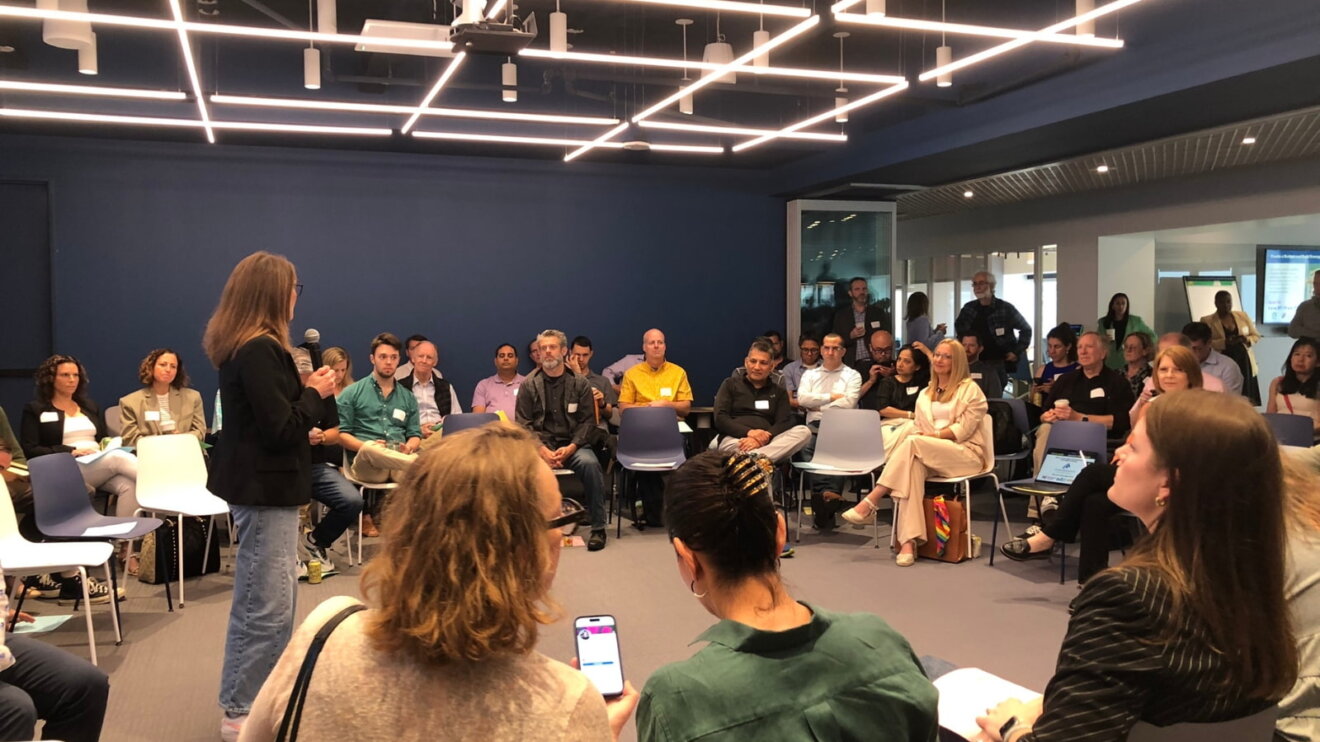Quick. What are you thinking about, worrying about, pondering… right now?
Now, take that mental bandwidth and turn that into a conference—an unConference, where participants lead the event, create the schedule on the fly and join discussions as they wish.
Right off the bat, I must admit to being an unabashed MTLC Innovation unConference super fan. From the second event in 2009 to the latest addition, I’ve made a valiant attempt to attend every single one. In fact, this year, in the opening moments, there was a countdown to see who’s been to the most events, and I was among the last folks standing.
I’ve joined sessions all over the map, from Burlington and Cambridge and the Hynes Convention Center. The 2024 event was held at KPMG’s Boston offices—see here for an overview. This year, we met at the Silicon Valley Bank offices in Boston.
Like last year, there were a lot of AI-focused sessions at the Innovation unConference. Here are just a few of the topics:
- How to build an investable company
- Is AI making us stupid?
- Non-dilutive funding
- Existential optimism
- Talent in 2030, and how to stay valuable when AI is better than you
- AI and talent acquisition
- Neurodivergence in startups (V2, to extend last year’s very popular discussion)

I attended four sessions.
Mission-driven Companies in an Anti-DEI World
Full disclosure: I proposed this one.
I wanted to know how other mission-focused organizations are operating in today’s increasingly DEI-hostile environment. With diversity initiatives being defunded and restricted due to political mandates, with women’s events and other DEI-focused conferences being cancelled and with various keywords, including “women,” being removed from government websites and documents, we see companies and individuals as hesitant to speak up, or act, fearing backlash or reprisals.
The big three takeaways:
- Many companies are rebranding, using words like “culture,” “values” or simply “inclusion,” where before they might have (rightly or wrongly) lumped it all under DEI.
- Many in the room believed that DEI is fundamentally about human rights and access, not optics or quotas. True equity requires structural change.
- One big concerning issue is the removal or alteration of public DEI-related (and some of them very tangentially related) datasets. There are active efforts underway to preserve them.
No One Understands Your Pitch (Sorry!)
The second session I attended with both my public relations and reporter/editor hat on. The goal was to help founders improve their pitches with a focus on concise, engaging and memorable storytelling. We heard pitches and advice from a group of experts and then a few brave souls volunteered their pitches for feedback.
Advice from the experts?
- Keep it short: Aim for 30–60 seconds. Long pitches lose.
- Be relatable: Use concrete, vivid examples or stories (“Have you ever had to split a bill and felt cheated?”).
- Lead with emotion: Evoke curiosity, frustration or familiarity to make your pitch stick.
- Tailor your pitch to the audience: Know whether you’re speaking to a VC, a consumer or a random person at a BBQ.
- Show the pain: Make the problem obvious and personal.
- Make it repeatable so listeners can advocate for you when you aren’t in the room.
- Don’t info-dump: Especially if it’s a casual setting. Let questions unfold naturally.
One model that emerged? Let’s call it the “bumper sticker” pitch structure.
- Bumper Sticker – two-three word hook or bold statement.
- Expansion – Short explanation of what you do.
- Proof – Traction, customers or results.
- Promise – Vision or where you’re headed.
- Close – Memorable phrase or one-liner for recall.
Events That Don’t Suck
(Yes, that was the actual name of the session.)
One of the discussions was all about events that people want to attend. We were asked, “What makes for a great event? What events have you gone to, other than the unConference, that you would classify as great?”
We started our discussion by pairing off with Business Biscuits (cookie-fueled intros) to help us connect. Meetings with food always rank well.
By the end of the hour, we had a whiteboard filled with ideas, examples and attributes. And we’d heard some stories for the ages! These are just a few suggestions for great events that, well, don’t suck.
- Speed meetings/dates
- Multi-location tour
- Crowdsourcing ideas for topics
- Failure stories/”war” stories
- Peer communities
- Food theme
- Cool spaces
- Job swap for a day
- Bring your own problem
- Incorporate exercise
- Curation of the attendees to ensure diversity
What Industries Won’t Be Impacted by AI?
Where will AI not matter—or where shouldn’t it matter—even if it could?
This session was one of my favorites because it fits well with my thinking around AI. There are plenty of places where AI can augment and support humans, without replacing them. For example, chefs use AI for ideation, not for actual cooking or serving food. Lots of trades can use AI, but there are still things requiring human creativity and dexterity (like haircuts, home care and home renovation). These are hard to fully automate.
People still prefer and value real, in-person experiences. Concerts, sports, travel and art are important because of their human aspects and, yes, their imperfections. “Perfection isn’t always better. There’s beauty in imperfection.”
The group had mixed feelings about the use of AI in eldercare and dementia care where artificial companionship can offer caretakers a respite but we are removing the human connection and touch.
And there was concern about the use of AI as a judge, referee or umpire. It might judge perfectly, but do we really trust it, and do we want to remove humans from the equation?
Curious how this year’s event compared to the last? Check out our 2024 Innovation unConference recap here.







Add Comment